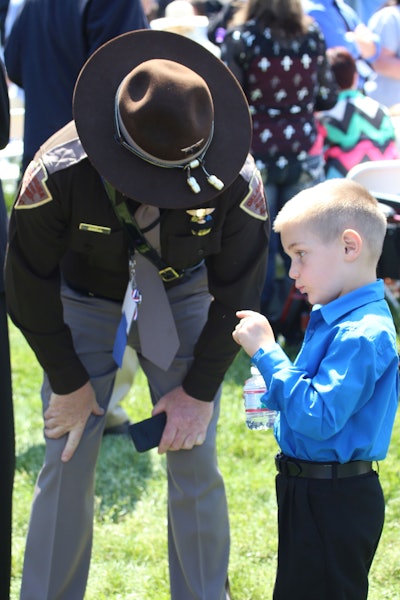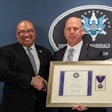 Photo: C.O.P.S.
Photo: C.O.P.S.
The year 2015 was another tough one for law enforcement. The men and women of law enforcement are not only America's peace keepers; they are fathers, mothers, husbands, wives, sons, daughters, brothers, sisters, and friends. For those who died, there is a week dedicated to honoring their sacrifice and remembering their surviving families. This year, 136 officers will be honored.
The week of May 11th through 17th will bring thousands of people to Washington, D.C. this year to observe National Police Week. The surviving families and co-workers of the 133 officers who died in 2015, as well as some who have been designated from previous years, will join together to honor their fallen heroes at events such as the annual Candlelight Vigil, the FOP Memorial Service, and the National Police Survivors' Conference presented by Concerns of Police Survivors (C.O.P.S.).
While honoring and remembering our fallen officers is vitally important, the mission of C.O.P.S. is to rebuild the shattered lives of survivors and co-workers affected by line-of-duty deaths through partnerships with law enforcement and the community. With 52 chapters across the country, members of C.O.P.S. are always prepared to help survivors when they need it, where they need it.
In addition to the National Police Survivors' Conference for adult survivors, C.O.P.S. also hosts the Kids/Teens Program to help minor-aged survivors in beginning their healing process after the death of their officer. During this two-day event, survivors will hear from experts in grief counseling and build a peer network on which they can rely as they continue their grief journey. They will return home with new coping tools to adapt to a new "normal" in their lives.
Below is a brief list of events for National Police Week 2016:
- Wednesday, May 11 – Early Arrival Day/Survivor Airport Pick-up
- Thursday, May 12 - Official Arrival Day /Survivor Airport Pick-up/ Law Enforcement United Arrival and Flag Presentations to 2015 Surviving Families
- Friday, May 13 - National Police Week Check-in/Registration at the Hilton Alexandria Mark Center/ 28th Annual Candlelight Vigil
- Saturday, May 14 - National Police Survivors' Conference (Day 1) / C.O.P.S. Kids/Teens Program (Day 1) / Day Care for Surviving Children and Siblings (Kindergarten through 12th grade)
- Sunday, May 15 - National Peace Officers' Memorial Service
- Monday, May 16 - National Police Survivors' Conference (Day 2) / C.O.P.S. Kids/Teens Program (Day 2) / Day Care for Surviving Children and Siblings (Kindergarten through 12th grade) / Picnic on the Patio
- Tuesday, May 17 - Official Departure Day
Visit www.nationalcops.org for a complete detailed schedule.
If unable to attend events in Washington, D.C., law enforcement supporters across the nation are encouraged to show support by flying a blue ribbon from your vehicle or mailbox, shine a blue light at your home or business, and/or change your social media profile image to the National Police Week logo found on the National C.O.P.S. Facebook page.
About Concerns of Police Survivors
Based in Camdenton, MO, Concerns of Police Survivors was founded in 1984 for the surviving families of law enforcement officers who have died in the line of duty as determined by C.O.P.S. criteria. Today C.O.P.S. serves over 37,000 people who have identified themselves as survivors nationwide. C.O.P.S. provides programs at no cost to survivors, as they have already paid too high a price. C.O.P.S. hosts a summer camp for surviving children ages 6-14, an Outward Bound Experience and a Young Adults Camp for surviving teens ages 15-20, and retreats for adult children, spouses, parents, fiancés/significant others, siblings, affected co-workers, co-workers and their spouse/domestic partner, and extended family.










